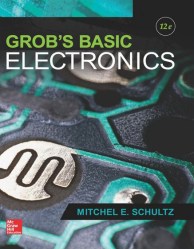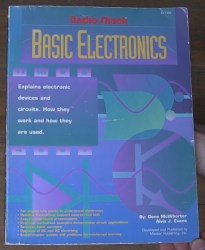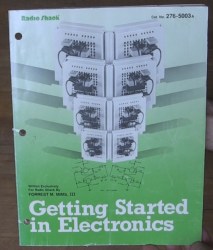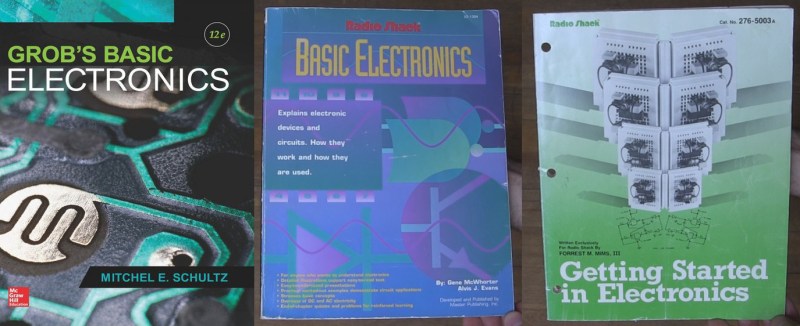I learned some basic electronics in high school physics class: resistors, capacitors, Kirchhoff’s law and such, and added only what was required for projects as I did them. Then around 15 years ago I decided to read some books to flesh out what I knew and add to my body of knowledge. It turned out to be hard to find good ones.
The electronics section of my bookcase has a number of what I’d consider duds, but also some gems. Here are the gems. They may not be the electronics-Rosetta-Stone for every hacker, but they are the rock on which I built my church and well worth a spot in your own reading list.
Grob’s Basic Electronics

Grob’s Basic Electronics by Mitchel E Schultz and Bernard Grob is a textbook, one that is easy to read yet very thorough. I bought mine from a used books store. The 1st Edition was published in 1959 and it’s currently on the 12th edition, published in 2015. Clearly this one has staying power.
I refer back to it frequently, most often to the chapters on resonance, induction and capacitance when working on LC circuits, like the ones in my crystal radios. There are also things in here that I couldn’t find anywhere else, including thoroughly exhaustive online searches. One such example is the correct definitions and formulas for the various magnetic units: ampere turns, field intensity, flux density…
I’d recommend it to a high school student or any adult who’s serious about knowing electronics well. I’d also recommend it to anyone who wants to reduce frustration when designing or debugging circuits.
You can find the table of contents here but briefly it has all the necessary introductory material on Ohm’s and Kirchhoff’s laws, parallel and series circuits, and so on but to give you an idea of how deep it goes it also has chapters on network theorems and complex numbers for AC circuits. Interestingly my 1977 4th edition has a chapter on vacuum tubes that’s gone in the current version and in its place is a plethora of new ones devoted to diodes, BJTs, FETs, thyristors and op-amps.
You can also do the practice problems and self-examination, just to make sure you understood it correctly. (I sometimes do them!) But also, being a textbook, the newest edition is expensive. However, a search for older but still recent editions on Amazon turns up some affordable used copies. Most of basic electronics hasn’t changed and my ancient edition is one of my more frequent go-to books. But it’s not the only gem I’ve found. Below are a few more.
Radio Shack Basic Electronics

I’d also recommend Radio Shack Basic Electronics by Gene McWhorter and Alvis J. Evans. It’s an intermediate book, one for a high school student or adult new to electronics. It doesn’t have the quantity of material that the much longer Grob’s Basic Electronics has but it is detailed while being easy to understand, if you take your time. I read most of it during free time on a 2 week business trip.
I refer back mostly to its chapter on semiconductors: diodes, bipolar transistors and FETs. Along with the necessary information on how to use them in circuits, there are also very detailed explanations of the science behind how they work. It also covers the expected laws, resistors, capacitors, DC, AC and resonance, as well as amplifier, oscillators and quite a bit of detail on digital circuits.
Getting Started In Electronics

And for the person who’s never even connected an LED to a battery there’s Getting Started in Electronics by Forrest M. Mimms, III. However, it’s also great for any hacker like me who wants to fill in the gaps, as it’s surprisingly detailed. Anyone who’s bought books at Radio Shack will probably recognize Mimms’ name as that’s where the book was originally sold, along with his equally wonderful Engineer’s Mini-Notebook series, also in my bookcase.
This was actually the first book I read when I started filling in my gaps. I enjoyed its simple explanations with fun, yet complete diagrams, but what I really liked were the 100 sample circuits to try at the end of the book. Actually seeing a working circuit reassured me that I was on the right track. I even later used its light flasher circuit when testing a homemade electrolytic capacitor.
The book starts out with atoms, electrostatics, current, and so on, gently working its way to the components. For that it starts with the simple ones like resistors and capacitors before moving on to the semiconductors such as diodes, transistors and MOSFETs and ending with photonic semiconductors.
And if you’re like me and want to understand the science behind things then it goes into a fair level of detail there too. For example, before going into semiconductors it explains how p-type and n-type silicon doping works.
More Books?
Everyone has their favorite basic electronics books, the ones they grew up with whether at home or in school. Like me you probably even still refer back to them. We’d be delighted if you’d let us know what they are, both for our own interest and for the benefit of other Hackaday readers. And if you have anything to say about the selections above, let us know that too.
























I still use the old Radio Shack books.
I have them all. The little books have been handy too.
Even the one on the CO CO computer.
Forgot about the CO CO books. I still have mine buried away on a bottom shelf. Taught myself BASIC and 6809e assembler with those as a kid. Sadly I no longer have a CO CO.
Operational Amplifiers; Design and Applications by Tobey,Graeme,Huelsman — (Burr Brown imprimatur);
also, Applications of Operational Amplifiers: Third Generation Techniques, by Graeme — (Burr Brown). Both are available used and cheap on Amazon. Essential reading if you want to design using op-amps.
Never seen the Grobs one but still own the radioshack ones.
I prefer eBooks. While traditional books are easier to read, eBooks are often somewhat cheaper and, at least here Finland, much easier to actually buy than physical books. That said, I wouldn’t mind a few pointers to some good beginner-friendly eBooks — I started self-studying electronics earlier this year, but having no friends, a boyfriend who isn’t interested in this stuff, and mostly just random bits and pieces I can find on the Internet with no proper course to follow make the progress go rather slow.
Don’t know if they are available as eBooks but check used school books for students in university of applied sciences. They have some quite good electronics basics books (Elektroniikan perusteet). Used books should be around 20€. And there should be books for digital and analog electronics that go deeper to their subjects than the general electronic books. Also google for the lesson material as quite many teachers share them for free.
Even better, many collage libraries have a shelf/pile of books that are being removed and they are ususally either free or cheap. My physical technical library grows that way the most.
Look on archive.org. They have a LOT of books in various electronic formats – FREE.
https://www.google.com/search?q=B86DB1A63B611E46110A66E7C287BBAD
All the books that were listed in a directory in archive.org were not available due to a problem with their content.
http://www.free-engineering-books.com/
In Finnish, an entertaining (even if somewhat outdated) beginner’s electronics book is “Elektroniikkaa sinulle”, Osmo A. Wiio, 1975. You might find it online or at library, but probably not as an ebook :)
I went through the books at the children’s library (which were really mostly about “electricity” than “electronics”), and then found the hobby electronics magazines. I couldn’t understand much at first, but that soon changed. So my earliest learning was mostly hobby electronic and ham radio magazines.
I did have “How to Become A Radio Amateur” and the ARRL Handbook a few months after I found the hobby electronic magazines, but books were expensive (though not compared to prices now). They weren’t so easy to find locally, either.
By the time the Forest Mims books arrived at Radio Shack, they were too simple for me, but Radio Shack had other interesting books, often from other publishers, but with a Radio Shack cover. We all loved buying the National data and application books at RS at the time. I still keep my Radio Shack Dictionary of Electronics handy, paid a dollar for it about 1977.
I wouldn’t live without an ARRL Handbook, but the current cover price doesn’t make it god beginner’s book unless one is interested in radio. But there are lots on the used market, for those chapters more universal. For those wanting to use tubes, an older edition is useful.
But there were Sams and Tab books, publishers aimed at the hobby market more or less. So there was a lot more out there, covering the simple or the complicted (like switching supplies) without going to text books. Sams published Walter Jung’s Op-Amp Cookbook, and Don Lancaster’s various books, still useful.
We forget that there was a time when an awful lot was printed on paper.
Not much shows up at used book sales here, but when it does it’s cheap and I grab it, which tends to widen the selection. Ham radio fleamarkets will turn up more, a more specific outlet for books and magazines about electronics and radio, and if you want the books the other things for sale will probably have some interest.
Of course basics remain basics, so the old can still be relevant, but of course will lack details of things that come later.
But that balances. If you need to know about tunnel diodes, you’ll need old books to get information. Older books and magazines also cover new topics better, because for everyone it’s new, and they need details. Later, explanations are smaller, because there’s an assumption that the readership already knows, or is no longer interested because it’s “old” technology. So for some things older books are better for the beginner. And some of that has gone out of copyright and is available in digital form.
Michael
Robert L Shrader’s Electronic Communication is an awesome book as well
I have the 3rd edition of “Practical Electronics for Inventors”. I found it easy to read, specially the chapters about capacitors, filters, and the one explaining how to use tools like multimeters and oscilloscope. I think it’s a beginner to intermediate level which everyone (really interested) can understand.
How can you leave out “The Art of Electronics” by Horrowitz and Hill.
The follow on Student Manual is also good.
Aka ‘The Bible’. That book is 10/10
Yep. This one. Best single electronics book on my shelf, once I had learned the basics.
The Art of Electronics was the most useful book I ever bought as an undergrad Electronic Engineering student. Still useful now, very readable and an awesome index that you can always find what you need.
Grob’s Basic Electronics is the book I recommend to everyone who asks. I say the same about saving some money by buying a slightly older edition.
The Art of Electronics by Horowitz and Hill
Op Amps for Everyone is in the 4th printed edition, but the 2nd and 3rd editions are available online in PDF form.
ARRL is a good reference and expensive. ARRL pocket reference cheaper and more useful. roundbout 20$USD. Little navy blue book like gold in ur pocket/desk. Forrest M. Mims III engineers notebook practical circuits 101 with formulas. Worthy of harddcopy. And hide it. Some smart ass gonna throw it in trash because it’s ugly not knowing ur notes and mods are in there as well. To some lesser extent the mini engineers’ notebooks. “Basic Electronics” very very basic. All those available online free if u just look. 74xx and 40xx discrete logics datasheets. Used to be in big ass volumes ,( three from National semi plus addendums errata) but available online Wikipedia. Print what u need and scribble all over. Assuming ur allowed pencils or crayons. Beginners robotics : Gordon McComb’s “Robot Builders Bonanza” now in Arduino flavor too. 4th editon out. Haven’t read latest; skimmed only. First and second were good though some of it probably obscure tech. Interfacing and hardware still worthy skim. Third more modern so probably more usefull. Gordon one of the few authors that hungout at comp.robotics.misc usenet group. Google them datasheets. Nirvana maaaan.
+1
I have a few of those pocket reference mini-books. Great piece for anyone really.
I’ll give a shout out to Electricity and Electronics by G. Randy Slone, 2nd ed (2000), $19 new on Amazon. Slone makes a controversial choice to only discuss electron flow and not conventional current flow, but he is careful enough with his choice of words that it isn’t confusing when paired with other books (ymmv). The explanations are otherwise clear, well paced, and well organized. The early circuit analysis intro uses LEDs in resistor networks, and while the author describes this as an arbitrary choice, I found it useful to be given target voltage drops and currents and be asked to solve for the resistors, as opposed to finding voltages and currents in a given resistor network. The first six chapters go straight into building a bench power supply one stage at a time with a natural conceptual progression. Later chapters include example circuits paired with each concept.
Practical Electronics for Inventors by Scherz and Monk is a modern classic and a useful reference. I own The Art of Electronics 3rd ed. and the new Learning the Art of Electronics student guide and I look forward to giving them a serious go someday, but they’re intimidating and overkill for beginners.
Specific to circuit analysis, I’m really enjoying MIT’s online circuit analysis course, MITx 6.002 on edx.org. Anant Agarwal is a master lecturer, and the textbook, Foundations of Analog and Digital Electronic Circuits by Agarwal and Lang, is excellent. It’s a real textbook with college-level math and it’s expensive to own, but you can read it for free online by signing up for the course (also free). I recently picked up Circuit Analysis for Dummies by John M. Santiago that follows the same progression. It’s definitely not “for Dummies” and it’s weird to see such rich material in the yellow-and-black cover, but what I’ve read seems like a good summary of the subject.
+1 for Basic Electronics by McWhorter & Evans. Surprisingly clear and concise given its form factor. There’s a companion volume on Basic Digital Electronics by Alvis Evans that’s pretty good, though I haven’t given it a serious look since I have too many books on digital.
I still show Mims’ Getting Started to kids when talking about electronics because the theory cartoons are great, but *as* a kid 30 years ago I had nothing but that book and no adult help to work with and found it frustrating when it jumped from theory to circuit grab bag. At the very least I needed someone to introduce me to solderless breadboards when I was 8. For beginner tutorials, Make: Electronics by Charles Platt is the new gold standard, though by design it doesn’t function as a reference like these others can. I would put Platt at the top of a list for beginners but it sounds like we’re discussing “books you’d go back to.” If I could give three books to my 8-year-old self, Platt’s M:E would be the first one.
Just a note on Slone’s book: the 50W amplifier circuit has errors in it (both the schematic and the board layout) that will cause it not to work. Don’t bother trying to build it.
Radio Shack: ‘Computer Programming in BASIC for Everyone’, Paperback – June, 1973.
One of the best books in the world from which to learn PROGRAMMING. Period.
As one reviewer put it exceedingly well, “Incredibly simple; amazingly informative.” This book is meant for NO ONE who understands programming. I’ll never forget how the concept of matrices was introduced by building a reservation system program for TAC (TakeAChance) airlines.
Disclaimer: if you can’t get past the slight references to dial-up modems, paper tape, and mainframes; and the use of BASIC, take a pass.
Wow – Didn’t know I could get the text online. I lost my copy and 35 years later I still remember lying on the couch studying the code in it. This book is how I learned to program with my Timex Sinclair ZX80 in BASIC and introduced me to programming. I really enjoyed that book. So simple and fun to learn with. I will buy a copy on Amazon just for nostalgia.
While I haven’t completed uploading the Navy Electricity Electronics Training Series module I have to archive.org, I see others have began uploading them as well. Free and downloadable in the Kindle format ,but I don’t know any images look. Search for NEETS, and probably as good as any purchase resource. I don’t know what the ARRL basic electronics book is like now; the on I purchased to supplement license classes I didn’t like it. The porkers illistrations where unprofessional and seemed to degrade the book to those where where rank begginers. There where those who claimed the I ARRL book contained errors and wouldn’t point them out; making it easy to dismiss their claims as ARRL hater who may not had ever looked at the book. Before using the ARRL book in the classes I cross referenced it to my tech school text books and never discovered any conflicts. Purchasing ARRL via Amazon is cheaper than purchasing directly from the ARRL, even for we ARRL members. When I had oilfield wages I belonged to an electronics book club, however many of the offerings weren’t beginner related. These days there are many free articles on the web and excellent new and old video on YouTube. Even some produced by Hackaday.
I’ve not read the current ARRL handbooks cover-to-cover like I did the 1978 version, but if they won’t point out the errors, well…
Tab Books, however, are horrible. And I’m not afraid to point them out.
https://www.amazon.com/review/R2314GGX26MQFF/ref=cm_cr_dp_cmt
https://archive.org/details/folkscanomy_electronics
good link. precious oldies.
I remember that Forrest Mimms book from my childhood. The picture of the silicon doping really brings back memories.
To those looking for good learings, I would reccomend the textbook that is avaliable for free when you take the MIT Circuits and Electronics 6.002 course on Edx.org
http://www.phy.davidson.edu/instrumentation/NEETS.htm Here is a good basic electronics ranting series the Navy uses… FREE — and its not written at a level that does not take a masters degree in English to understand..
Is that ironic? I think you meant “… and it is written at a level that does not take a Master’s degree in English to understand..”
great little review, thanks
Please don’t waste your time on Tab Books. They are rife with errors. I’ve read a lot of them,
Their CET Study Guide is horrible. Multiple egregious errors in every chapter. I’m not talking about a few typos. I mean outright wrong information, and sample questions with no correct answers.
https://www.amazon.com/review/R2314GGX26MQFF/ref=cm_cr_dp_cmt
You have to watch out for that. I bought the following book at a thrift store to add to the OlyMEGA makerspace library, but fortunately I read it first. Horrible. Looking at the previews on Amazon, he puts many of the same mistakes in all of his books.
https://www.amazon.com/gp/review/R2VUZ6NC15HZK3?ref_=glimp_1rv_cl
The local Amateur Radio club sales (hamfests) are usually shot through with old electronics books, including ARRL books. If you are interested in tube circuits, the older ones are helpful, and they put a new one out every year. Some folks will try to get five or ten dollars for them, and someone the next row over will have them for a dollar apiece. Quite easy to have multiple copies on hand inexpensively for anyone who will take them home to read them.
pfew – grob is already sitting unread on my bookshelf. i’m set!
When I (briefly) dabbled in electronics in high school before eventually becoming a computer geek, one book I used to own was the Forrest Mims Engineers Notebook. Full of all kinds of neat things to do with all kinds of nifty ICs.
“Electronic Principles”, Albert Paul Malvino
Emphasis: Understanding transistors and transistor amplifier circuits
Bonus: Exposure to other devices (semiconductors).
There is a free online e-book at ibilio. It have 6 volumes covering DC, AC, Semiconductors, Digital Circuits, References and Experiments.
“Lessons in Eletrict Circuits”, Tony R. Kuphaldt
https://www.ibiblio.org/kuphaldt/electricCircuits/